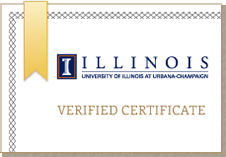Designing Cities (Earn a Verified Certificate)
The course explores visionary and practical concepts of city design and planning, past and present, and how design can address such looming challenges as urban population growth, climate change and rising sea levels. Participants will be encouraged to make proposals for city design and development, starting with their own immediate environment.
Workload: 4-6 hours/week
Taught In: English
Subtitles Available In: English
Study ahead. Take college-level courses not offered at school.
In high school and getting ready for college? In college and looking for additional study materials? Coursera has courses to help you excel in school.
About the Course
Designing Cities is a ten-week course starting in October 2013. Every week will focus on a different aspect of Designing Cities including: How Today’s City Evolved; The Ideas That Shape Cities; Tools for Designing Cities; Making Cities Sustainable; Cities in the Information Age; Preserving Older Cities; Designing New Cities, Districts and Neighborhoods; The Challenges of Informal Cities and Disadvantaged Neighborhoods; and Visionary Cities. Materials will be presented by the instructors and guest faculty from PennDesign through a series of five or more modules per week, each typically 10-12 minutes long.
The first module each week will be a roundtable discussion among professors Stefan Al, Jonathan Barnett, and Gary Hack introducing the big issues associated with the subject. Each succeeding module will be a self-contained illustrated presentation of a set of ideas and images. There will be a list of suggested readings for those who wish to follow up on the ideas in each module.
Everyone enrolled in Designing Cities will be expected to complete 3 assignments. These will be posted on the course site and they will be in the form of peer assessments. There will also be three sessions where we discuss a selection of the assignments that have been submitted. There will be a great deal to be learned from the ideas participants submit, reflecting cities of all sizes and circumstances across the globe.
The course concludes with a discussion by the faculty of the issues raised in the discussion groups and responses to the assignments. We are looking forward to connecting with you and seeing the issues at the forefront in designing your city. Course Syllabus
This is a ten-week course which requires completion of three assignments. The instructors will select some of the assignments submitted and discuss them as part of the course.
Each week’s modules will be introduced by a discussion by all three instructors.
Week 1: How Today’s City Evolved
- Introductory Discussion
- The Pre-Industrial City
- Cities in the Industrial Revolution
- Cities in 1950
- Today’s Regional City
Week 2: Ideas That Shape Cities
- Introductory Discussion
- Modernist City Design
- Traditional City Design
- Green City Design
- Systems City Design
Week 3: Tools for Designing Cities
- Introductory Discussion
- Investments in Infrastructure
- Codes and Design Guidelines
- Incentives for Better City Design
- Negotiation for Common Goods
- Discussion by the instructors about selected submissions for the first assignment
Week 4: Making Cities Sustainable
- Introductory Discussion
- Ecological Urbanism
- Transportation as the Growth Armature
- Managing Water: Flooding and Scarcity
- Green Infrastructure and Renewable Energy
- Introductory Discussion
- Managing Energy Consumption
- Intelligent Cities
- Spatial Patterns that Promote Personal Communication
- Mixing Home, Work, Culture and Recreation
Week 6: Preserving Older Cities
- Introductory Discussion
- Landmarks and Historic Districts
- Adaptive Re-Use of Old Buildings
- Preserving the Industrial Heritage
- Discussion by the instructors about selected submissions for the second assignment
Week 7: Designing New Cities, Districts and Neighborhoods
- Introductory Discussion and the Third Assignment
- The Idea of New Towns and Cities
- Urban Form of New Places
- The Public Realm – Streets, Parks and Places
- Walkable Neighborhoods and Business Centers
Week 8: The Challenges of Informal Cities and Disadvantaged Neighborhoods
- Introductory Discussion
- Rapid Urbanization and Informal Settlements (David Gouverneur)
- Land Tenure and Stability
- Retrofitting Infrastructure and Services
- Combating Poverty and Urban Deterioration
Week 9: Visionary Cities
- Introductory Discussion
- Technological Visions
- Ecological Visions
- Revolutionary Visions
- The Self-Organizing City
Week 10: Concluding Comments
- Discussion by the three instructors of selected submissions for the third assignment
- Concluding Remarks
Recommended Background
The design and development of cities, towns and suburbs affects everyone. We want to open up consideration of the basic concepts of city design and planning for informed discussion among people of any background, who will be encouraged to use information from the course to make their own observations and comments about city design and development, starting with their own immediate environment. We especially welcome planning, landscape architecture, and architecture students and professionals, those contemplating a career in these areas, and public officials who have responsibility over city development, although a professional discipline or public office is not a prerequisite. We will make our presentations using the latest technical information and examples, but they should be understandable even if you have no previous background in our subjects.
Course Format
The basic components of the course are: content modules, as shown in the syllabus; three assignments, required for those who wish to receive a statement of accomplishment, and encouraged for all; participation in peer critiques of assignments; suggested readings that go beyond the materials in the modules.
FAQ
Do I have to do the assignments? Browsers are welcome but there is much to be gained by applying the ideas of the course to your city, and both getting and giving feedback on the three assignments.
Will I get a Statement of Accomplishment after completing the course? Yes, students who successfully complete the the three assignments and give feedback to others will receive a Statement of Accomplishment signed by the instructors.
What resources will I need for this course? An internet connection, of course. A computer that is equipped to create .pdf files with images and text. A digital camera (or phone with a camera) for taking photos of your city and any sketches or drawings you make. You need not be skilled in drawing -- rough sketches are fine. A map of your city will help others understand the areas you are talking about.
What will I take away from the course? A vocabulary for talking about design of cities. Knowledge of design ideas that have been tried over the years, and their results. Understandings of how cities differ across the globe. Understanding of the kinds of challenges that will be faced in designing cities over the next couple of decades.
Will the instructors actually see the materials I submit? We have scheduled three sessions to show and comment on some of the most interesting of the assignments submitted, and will have a way that peer reviewers can spotlight those we should review. If the enrollments are very large, it won't be possible for us to review every assignment submitted in time for the three sessions. But the value of the assignments is in helping you think about design issues in your city.
Will I get a Statement of Accomplishment after completing the course? Yes, students who successfully complete the the three assignments and give feedback to others will receive a Statement of Accomplishment signed by the instructors.
What resources will I need for this course? An internet connection, of course. A computer that is equipped to create .pdf files with images and text. A digital camera (or phone with a camera) for taking photos of your city and any sketches or drawings you make. You need not be skilled in drawing -- rough sketches are fine. A map of your city will help others understand the areas you are talking about.
What will I take away from the course? A vocabulary for talking about design of cities. Knowledge of design ideas that have been tried over the years, and their results. Understandings of how cities differ across the globe. Understanding of the kinds of challenges that will be faced in designing cities over the next couple of decades.
Will the instructors actually see the materials I submit? We have scheduled three sessions to show and comment on some of the most interesting of the assignments submitted, and will have a way that peer reviewers can spotlight those we should review. If the enrollments are very large, it won't be possible for us to review every assignment submitted in time for the three sessions. But the value of the assignments is in helping you think about design issues in your city.


